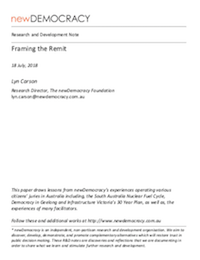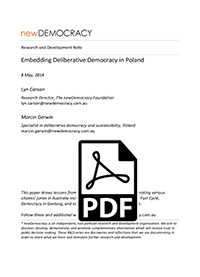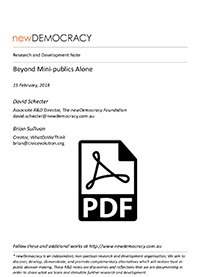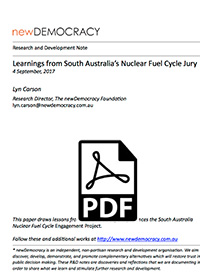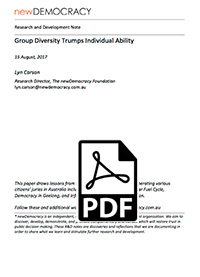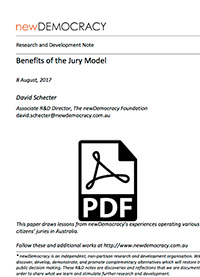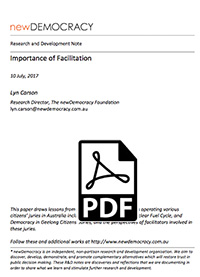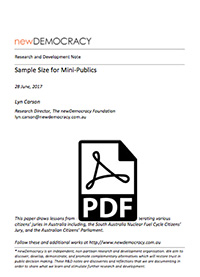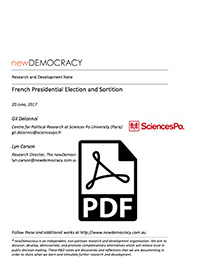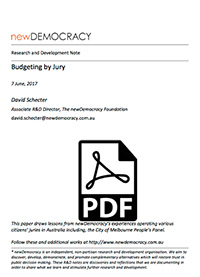Lyn Carson – Research Director, The newDemocracy Foundation What is the question? How to develop a question for public deliberation that satisfies the needs of both participants and organisers, without leading participants toward a pre-determined answer or introducing unnecessary confusion?
Research Notes
Embedding Deliberative Democracy in Poland
Lyn Carson – Research Director, The newDemocracy FoundationMarcin Gerwin – Specialist in deliberative democracy and sustainability, Poland What is the question? There have been many successful examples worldwide of mini-public deliberation on tough policy issues, but few examples of incorporating it as an ongoing part of “the way we do democracy.” One of the rare exceptions can be found...Continue reading
Beyond Mini-publics Alone
David Schecter – Associate R&D Director, The newDemocracy FoundationBrian Sullivan – Creator, WhatDoWeThink What is the question? In recent years, Australia has seen many successful examples of incorporating mini-publics (See, Mini-publics) into public decision-making. Compared to the usual public engagement practices, these projects have been substantially more informed, more representative, more deliberative, and more influential. They have...Continue reading
Learnings from South Australia’s Nuclear Fuel Cycle Jury
Lyn Carson – Research Director, The newDemocracy Foundation What is the question? In 2016, newDemocracy had oversight of a massive public deliberation in South Australia on the extremely contentious issue of nuclear waste storage. It was our biggest project to date. Any journey into the unknown is a rich site for learning, and this project...
Group Diversity Trumps Individual Ability
Lyn Carson – Research Director, The newDemocracy Foundation What is the question? When assembling a randomly-selected group of people, for example in a citizens’ jury (see, Sample Size for mini-publics), what attributes are most important for the group members if they are to handle complex matters? What are the usual answers? This question is...
Benefits of the Jury Model
David Schecter – Associate R&D Director, The newDemocracy Foundation What is the question? Why use the jury model of random selection and deliberation? Why would public officials want to incorporate the jury model into public decision making? What are the benefits of the jury model, compared to the usual forms of public engagement?
Importance of Facilitation
Lyn Carson – Research Director, The newDemocracy Foundation What is the question? How are the usual challenges associated with working with groups addressed in mini-publics? What are the usual answers? In the political landscape, groups are commonly chaired (in committees) or arbitrated by a Speaker (in parliaments). When citizens are brought together in a public space,...Continue reading
Sample Size for Mini-Publics
Lyn Carson – Research Director, The newDemocracy Foundation What is the question? When convening a mini-public, certain basic parameters must be met: the group should be diverse and inclusive (Landemore, 2012), and it should have time and sufficient information to deliberate well (March & Carson, 2013) (See, Deliberation), and its decisions should be influential. When discussing...
French Presidential Election and Sortition
Gil Delannoi – Centre for Political Research at Sciences Po University (Paris)Lyn Carson – Research Director, the newDemocracy Foundation Presidential campaign Something rather unusual happened in France during the campaign for president in 2017. Although the world watched with interest as Emmanuel Macron and Martine Le Pen competed in the second round of presidential elections, some fascinating...Continue reading
Budgeting By Jury
David Schecter – Associate R&D Director, The newDemocracy Foundation What is the question? Budgeting is hard. Governments are faced with expanding demands for services and needs for infrastructure, combined with insufficient ability to raise revenue. Elected representatives face intense and conflicting pressures from interest groups. Public opinion, as evidenced through the media, is likely to be...Continue reading

